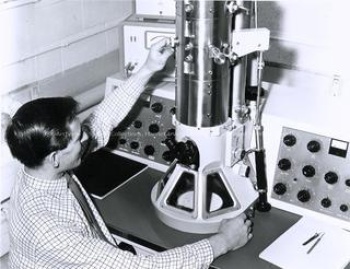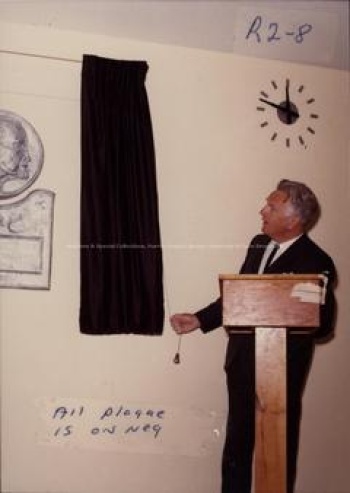Previously named: Chemistry and Natural Science
Established: 1941
History: Throughout the nineteenth century at the University of New Brunswick, the study of Chemistry was considered a necessary but subordinate discipline in the University's curriculum, largely due to a significant lack of apparatus and funding. Scottish scientist James Robb's arrival to the University allowed for the earliest formal instruction in Chemistry in the province.
By 1850, UNB, formerly known then as King's College, was the only university in Canada providing courses in Chemistry. In the 1860s and 1870s, Chemistry and Physics were only offered in a student’s freshman year, while Natural Science courses were mainly taught in the sophomore and senior years. While scientists James Robb and L.W. Bailey both successfully occupied the position of Chair of Chemistry and Natural Science over the course of the late nineteenth and early twentieth centuries, there were marginal developments within the Chemistry discipline at UNB. The experimental sciences, which included Chemistry and Physics, were not initially expected to achieve significant growth or attention in New Brunswick, in contrast with the rapidly-expanding study of Geology and Biology. By 1900, Chemistry lectures were prepared and given by the Professor of Civil Engineering, Stephen M. Dixon. Chemistry became its own program, and the university offered ordinary and honours courses not affiliated with Natural Sciences. Course offerings during this time included Chemistry of the Non-Metals, Chemistry of the Metals, Organic Chemistry, Physical Chemistry, and Analysis of Foods and Poisons, with laboratory work beginning in a student’s third year. Laboratory work became more prominent as the twentieth century progressed, with the university creating a designated laboratory for chemistry and gradually obtaining more experimental apparatus.
With the creation of the Faculty of Applied Science in 1909, courses in Chemistry were offered to students working towards their Bachelor of Science in Forestry, Civil Engineering, and Electrical Engineering respectively. Initially, the Chemistry courses offered under the Department of Applied Science were identical to the courses under the Faculty of Arts. The number of courses offered in Chemistry grew slowly but steadily over the early twentieth century. The first assistant professor in Chemistry was appointed in 1930, allowing for further developments for a department of Chemistry at UNB. Research in Chemistry was not fully attempted until 1939, when National Research Council grants helped establish a research laboratory. In 1941, Chemistry was officially departmentalized with only nine course offerings. Following the end of the Second World War, student enrollment greatly increased in the department, which led to the hiring of more instructors. A graduate course in Chemistry was established shortly afterwards. The Bachelor of Science program in Chemistry was recognized as a broader program than most in other Canadian universities by the late 1940s, as it offered considerable instruction in Mathematics, Physics, Biology, and Geology. The Department of Chemistry included a staff of four professors and one instructor by 1950. Course offerings grew to twenty courses by 1955, and forty courses by 1974. Some of the newer courses included Bio-Organic Chemistry, Quantum Chemistry and Spectroscopy, Molecular Spectroscopy, and Organometallic Chemistry.
Interdisciplinary programs proved to be considerably popular among students concentrated in both chemistry and another science, such as biology, physics, geology, and even mathematics. The Biology-Chemistry program became the most popular among undergraduate students. The 1980s saw a slow increase in course offerings over the decade and increased enrollment in first-year Chemistry courses, due to the growing number of engineering students at UNB. As a result, evening Chemistry labs were introduced to accommodate the students' schedules. Funding for equipment also improved in the early 1980s, with the Department receiving over 1.16 million dollars in research grants for administering studies on molecular cloning and gene expression in cancer research, synthesis of cardiotonic drugs, and so on. Meanwhile class sizes in upper-level Chemistry courses decreased, leading the Department to revise the program and eliminate all optional fourth-year courses.
From the mid-1990s to 2000s, there were more than fifty courses under the Department of Chemistry and approximately twenty-four instructors. Courses in Chemistry began intersecting with other science disciplines more often, exemplified in courses such as Chemistry in Pulp and Paper, Biocomputing in Drug Design, and Bio-Organic Chemistry of Nucleic Acids. Degree programs in Chemistry include Major, Medicinal Chemistry Major, Honours, Medicinal Chemistry Honours, and Honours Co-op. In the 2012-2013 academic year, there were fifty-one courses in Chemistry and twenty-five instructors.
Physical location: Francis J. Toole Hall
Faculty: Science
Notes: The year that a certain department was established can be a subjective figure. For the purpose of this wiki, the year that a department is considered first established is the first year it was listed in the academic calendar as an independent chair with no other affiliation, unless documentation can demonstrate otherwise.
Source(s):
- Department of Chemistry fonds (UA RG 168); Series 1, Sub-series 1, Box 1, File 11.
- Toole, F.J. “Chapter VI: The Scientific Tradition”. The University of New Brunswick Memorial Volume. Ed. Alfred G. Bailey. Fredericton: University of New Brunswick, 1950. 69-74. Print.
- UA Case 86; Sections 1, 2.
- UA RG 38; University Correspondence (1920-1965); item 323.
- UNB Calendars (UA RG 86) 1887-88, 1897-98, 1900, 1906, 1909, 1941, 1954-55, 1969-70, 1973-74, 1977-78, 1982-83, 1983-84, 1988-89, 1995-96, 1997-98, 2003-04, 2006-07, 2011-12, 2012-13.
- Main Page
- Anniversaries
- Brief History of UNB
- Buildings
- Faculties and Departments
- Governance and Administrative Positions
- Lecture Series
- Official University Events and Symbols
- People of UNB
- Plaques, Monuments and Structures
- Prizes and Awards
- Sports and Athletics
- Student Clubs and Societies
- Student Events and Escapades
- University Publications
- Women's Sports at UNB
- About UNB Archives and Special Collections
Request an Appointment
Prior arrangements must be made for the retrieval of this material. Please email archives@unb.ca to make an appointment.
Procedures
Help Desk Hours
- Monday - Friday
- 10:00 am - 12:00 pm
- 1:00 pm - 4:00 pm
Contact Us
- 5th Floor, Harriet Irving Library
- University of New Brunswick
- 5 Macaulay Lane, Box 7500
- Fredericton, NB E3B 5H5 Canada
- archives@unb.ca
- Staff Directory

